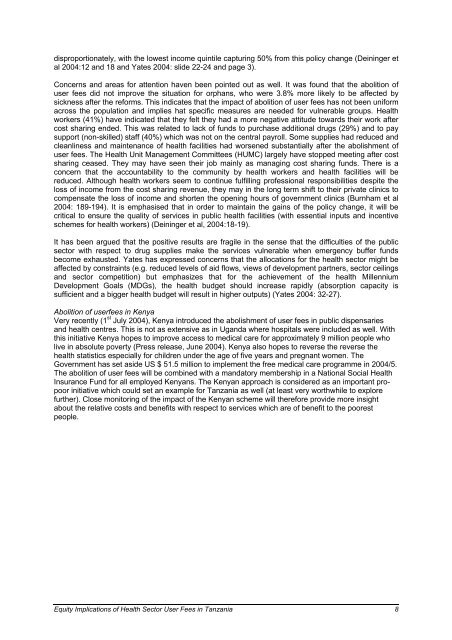equity implications of health sector user fees in tanzania
equity implications of health sector user fees in tanzania
equity implications of health sector user fees in tanzania
Create successful ePaper yourself
Turn your PDF publications into a flip-book with our unique Google optimized e-Paper software.
disproportionately, with the lowest <strong>in</strong>come qu<strong>in</strong>tile captur<strong>in</strong>g 50% from this policy change (De<strong>in</strong><strong>in</strong>ger et<br />
al 2004:12 and 18 and Yates 2004: slide 22-24 and page 3).<br />
Concerns and areas for attention haven been po<strong>in</strong>ted out as well. It was found that the abolition <strong>of</strong><br />
<strong>user</strong> <strong>fees</strong> did not improve the situation for orphans, who were 3.8% more likely to be affected by<br />
sickness after the reforms. This <strong>in</strong>dicates that the impact <strong>of</strong> abolition <strong>of</strong> <strong>user</strong> <strong>fees</strong> has not been uniform<br />
across the population and implies hat specific measures are needed for vulnerable groups. Health<br />
workers (41%) have <strong>in</strong>dicated that they felt they had a more negative attitude towards their work after<br />
cost shar<strong>in</strong>g ended. This was related to lack <strong>of</strong> funds to purchase additional drugs (29%) and to pay<br />
support (non-skilled) staff (40%) which was not on the central payroll. Some supplies had reduced and<br />
cleanl<strong>in</strong>ess and ma<strong>in</strong>tenance <strong>of</strong> <strong>health</strong> facilities had worsened substantially after the abolishment <strong>of</strong><br />
<strong>user</strong> <strong>fees</strong>. The Health Unit Management Committees (HUMC) largely have stopped meet<strong>in</strong>g after cost<br />
shar<strong>in</strong>g ceased. They may have seen their job ma<strong>in</strong>ly as manag<strong>in</strong>g cost shar<strong>in</strong>g funds. There is a<br />
concern that the accountability to the community by <strong>health</strong> workers and <strong>health</strong> facilities will be<br />
reduced. Although <strong>health</strong> workers seem to cont<strong>in</strong>ue fulfill<strong>in</strong>g pr<strong>of</strong>essional responsibilities despite the<br />
loss <strong>of</strong> <strong>in</strong>come from the cost shar<strong>in</strong>g revenue, they may <strong>in</strong> the long term shift to their private cl<strong>in</strong>ics to<br />
compensate the loss <strong>of</strong> <strong>in</strong>come and shorten the open<strong>in</strong>g hours <strong>of</strong> government cl<strong>in</strong>ics (Burnham et al<br />
2004: 189-194). It is emphasised that <strong>in</strong> order to ma<strong>in</strong>ta<strong>in</strong> the ga<strong>in</strong>s <strong>of</strong> the policy change, it will be<br />
critical to ensure the quality <strong>of</strong> services <strong>in</strong> public <strong>health</strong> facilities (with essential <strong>in</strong>puts and <strong>in</strong>centive<br />
schemes for <strong>health</strong> workers) (De<strong>in</strong><strong>in</strong>ger et al, 2004:18-19).<br />
It has been argued that the positive results are fragile <strong>in</strong> the sense that the difficulties <strong>of</strong> the public<br />
<strong>sector</strong> with respect to drug supplies make the services vulnerable when emergency buffer funds<br />
become exhausted. Yates has expressed concerns that the allocations for the <strong>health</strong> <strong>sector</strong> might be<br />
affected by constra<strong>in</strong>ts (e.g. reduced levels <strong>of</strong> aid flows, views <strong>of</strong> development partners, <strong>sector</strong> ceil<strong>in</strong>gs<br />
and <strong>sector</strong> competition) but emphasizes that for the achievement <strong>of</strong> the <strong>health</strong> Millennium<br />
Development Goals (MDGs), the <strong>health</strong> budget should <strong>in</strong>crease rapidly (absorption capacity is<br />
sufficient and a bigger <strong>health</strong> budget will result <strong>in</strong> higher outputs) (Yates 2004: 32-27).<br />
Abolition <strong>of</strong> <strong>user</strong><strong>fees</strong> <strong>in</strong> Kenya<br />
Very recently (1 st July 2004), Kenya <strong>in</strong>troduced the abolishment <strong>of</strong> <strong>user</strong> <strong>fees</strong> <strong>in</strong> public dispensaries<br />
and <strong>health</strong> centres. This is not as extensive as <strong>in</strong> Uganda where hospitals were <strong>in</strong>cluded as well. With<br />
this <strong>in</strong>itiative Kenya hopes to improve access to medical care for approximately 9 million people who<br />
live <strong>in</strong> absolute poverty (Press release, June 2004). Kenya also hopes to reverse the reverse the<br />
<strong>health</strong> statistics especially for children under the age <strong>of</strong> five years and pregnant women. The<br />
Government has set aside US $ 51.5 million to implement the free medical care programme <strong>in</strong> 2004/5.<br />
The abolition <strong>of</strong> <strong>user</strong> <strong>fees</strong> will be comb<strong>in</strong>ed with a mandatory membership <strong>in</strong> a National Social Health<br />
Insurance Fund for all employed Kenyans. The Kenyan approach is considered as an important propoor<br />
<strong>in</strong>itiative which could set an example for Tanzania as well (at least very worthwhile to explore<br />
further). Close monitor<strong>in</strong>g <strong>of</strong> the impact <strong>of</strong> the Kenyan scheme will therefore provide more <strong>in</strong>sight<br />
about the relative costs and benefits with respect to services which are <strong>of</strong> benefit to the poorest<br />
people.<br />
Equity Implications <strong>of</strong> Health Sector User Fees <strong>in</strong> Tanzania 8













